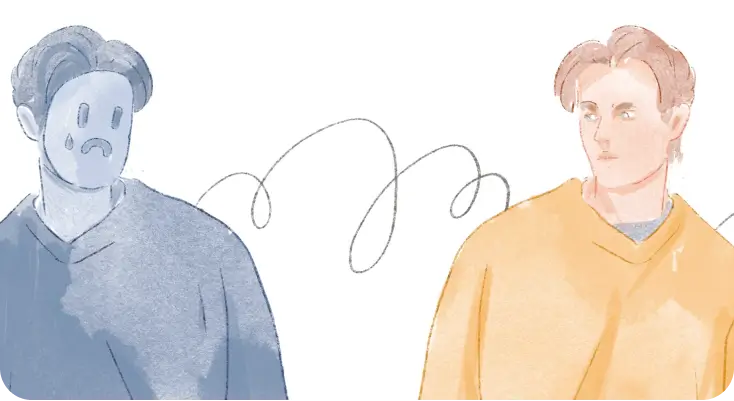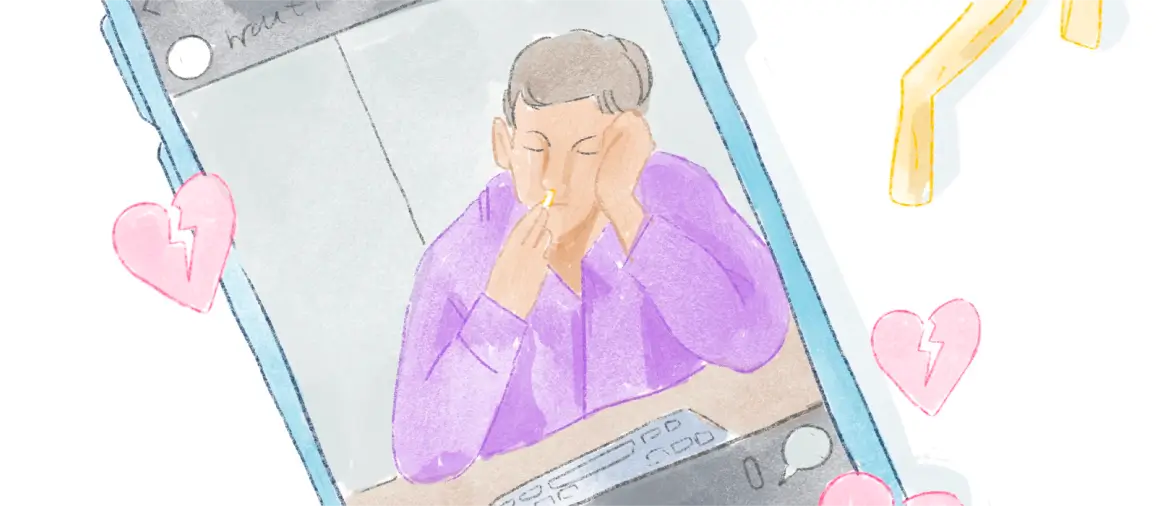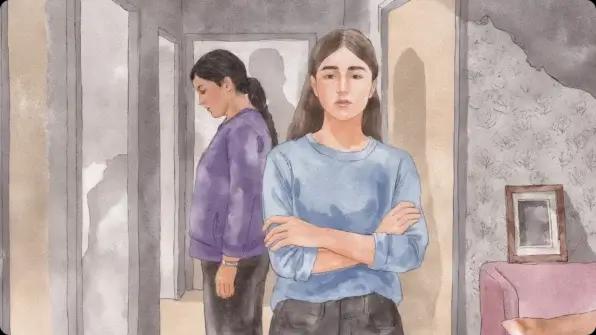Podcast name
Why does nobody like me?
We’ve all experienced times of feeling overlooked or left out. That moment of scrolling through Instagram, seeing everyone else having the time of their lives without you.
Or that awkward silence when your coworkers head out for drinks and don’t even ask if you want to join. You might think, “No one cares about me” or even, “Why doesn’t anybody like me?”
It hurts and can leave you feeling isolated or questioning your self-worth and social skills.
You start wondering if you’ve missed some secret social playbook. Why do some people seem to effortlessly make friends and turn heads while others constantly struggle with feeling alone and ask themselves, “Why does nobody like me?”
Is it simply a matter of luck, a hidden personality flaw, or maybe just a misunderstanding of how social interactions work?
As you’ll discover, the answer is often far more complex than we initially might believe. This article will help you explore the roots of why you might feel unliked and the potential reasons behind your loneliness.
4 reasons for “Why don’t people like me?”
Many factors can influence our perception of the world and how we see people. Sometimes, it’s just the way society works, sometimes, it’s all about us. Of course, we all come from childhood, so this is an excellent place to start looking for answers to the question, “Why does no one want me around?”
1. Childhood Trauma
One of the main reasons for thinking “no one loves me” can be childhood trauma. Childhood trauma can take many forms, such as childhood emotional neglect, mother wound, physical or emotional abuse, bullying, or the loss of a loved one.
These experiences could deeply affect your sense of self and your relationships with others. Here’s how childhood trauma can lead to feelings like “nobody likes me”:
1. Negative self-image
“Why do I get uncomfortable when someone likes me?” Your inner critic voice might be one reason. Feeling like you’re not good enough, attractive enough, or interesting enough is a hallmark of low self-esteem, which is often seen in someone who may have experienced attachment trauma. People with both dismissive-avoidant attachment style and anxious-avoidant attachment style may struggle with negative self-talk. However, dismissive-avoidant people might mask it with an outward appearance of confidence.
2. It’s difficult to trust others
Mistrust can also contribute to feeling like no one likes you. It can be hard to open up to new people if you were feeling betrayed or let down as a child. You might worry about getting hurt or having abandonment issues all over again.
3. Fear of rejection
That fear can be paralyzing. You hesitate to take risks in relationships or pursue your dreams because the thought of rejection feels unbearable. You may start thinking, “No one wants me in their life, so I need to protect myself from being rejected in advance.”
4. Self-sabotage
This one’s sneaky. You might unconsciously create problems in your relationships or job, confirming your belief that you’re destined to fail. “I feel like no one likes me at work, no one understands me.”
We may not even notice how we start creating negative scenarios in every aspect of our lives because we think we are not worth anything good. You start to look for information that confirms these beliefs rather than looking at situations realistically.
Our human emotions can play tricks on our thoughts, so it’s important to notice those moments and understand whether these thoughts are truly ours or simply a product of our emotions.
5. People-pleasing
People-pleasing behavior can also fuel the idea that no one likes you. You go out of your way to make others happy, even if it means sacrificing your own needs or happiness. You might agree with people even when you disagree or take on tasks you don’t have time for just to avoid conflict or disapproval.
Feeling held back by the past or wondering if childhood experiences affect you? Seeking professional help is always a good idea.
In the meantime, our 28-Day Childhood Trauma Healing Plan can offer immediate insights and help you understand your healing journey. It’s a gentle approach to processing past experiences to feel lighter and more at peace.
2. Depression
Yes, depression can also make you feel like nobody likes you. It may distort your thinking, making you focus on the negative and doubt yourself.
For example, a friend might invite you for coffee, but depression can make you stay in your room instead without any desire to communicate with anyone. Perhaps you even can think, “I feel like no one understands me, and that’s why no one wants me around.”
It can also make you ask yourself, “Why do I feel empty? “Am I lazy or depressed?” and withdraw from others, which strains relationships.
These feelings are a symptom of depression, not reality. If you’re struggling, seeking help from a mental health professional is crucial for diagnosis and treatment.
3. Social anxiety
Social anxiety is the fear of being judged or negatively evaluated by others. This fear can lead to avoiding social situations, making the act of forming and maintaining relationships difficult.
If you have social anxiety, you might worry about what others think of you, perhaps even thinking, “I feel like no one wants me in their life, nobody wants to talk to me.” This fear of judgment can then cause you to avoid social interactions altogether.
And sometimes, it’s more than just our thoughts. Depression can make us feel isolated and disconnected from others, even if they care about us.
Perceptions of judgment can make interactions feel threatening, leading to avoidance or withdrawal.
4. Perfectionism
Do you hold yourself to impossibly high standards? When you’re always striving for perfection, it’s easy to feel like you’re falling short, that others are judging you, and thus ending that you might feel no one likes you.
Perfectionism can make you feel isolated, and you may ask yourself, “Why do I feel like nobody likes me?” It sets unrealistic standards for yourself and others, creating distance in relationships. Fear of judgment, difficulty relaxing, and sensitivity to criticism all hinder opportunities for vulnerability and connection.

Examples of “nobody likes me” feeling
Our minds often distort reality, leading to misunderstandings. Here are some common thinking patterns that can contribute to feeling disliked:
- Thinking in extremes: It’s called all-or-nothing thinking – seeing the world in extremes – either everyone likes you or no one does, without the third option. For example, if one friend cancels plans, you might think, “No one wants to hang out with me.”
- Making assumptions: If you feel like nobody likes you, you might start guessing others’ thoughts and feelings without evidence. You might think, “That officer didn’t smile at me because they don’t like me.
And that seller was rude when I asked about the fruit’s price! Definitely, no one wants to be around me.” These assumptions can easily lead you to conclude, “I try to make friends, but nobody likes me.”
- Ignoring the good: Ignoring positive interactions and focusing solely on the negative. For instance, you might dwell on a single awkward moment during a conversation you had and overlook all the enjoyable parts.
- Personalizing: The tendency to take things personally when they might not be about you. As an illustration, if a friend seems distant, you automatically assume they’re upset with you instead of considering other possibilities. You might think, “I always help others, but nobody helps me.”
You start thinking they are avoiding you, even creating scenarios where you feel everyone hates you for something, and that’s why no one cares to help. But in reality, they might just be having a bad day or overwhelmed with their problems.
- Catastrophizing: Blowing things out of proportion and imagining the worst-case scenario. For example, if you don’t get a response to a text message right away, you might worry that the person is deliberately ignoring you or that the friendship is over. You might even feel like no one likes you.
The nature of the “nobody likes me” feeling
Humans are social creatures, yet it’s very common to feel like we don’t fit in. We might think, “No one wants me around, so why bother trying to make friends?” In fact, over half of Americans report experiencing loneliness. So you’re definitely not alone in feeling this way.
The truth is, this sense of isolation often stems from our external circumstances as well as from an internal criticism we all carry. Negative thoughts, like those telling us, “No one likes you,” or that we are not good enough, can quickly become addictive and self-perpetuating.
The feeling of not being liked can come from many places. Maybe it started with tough childhood experiences, or perhaps it’s linked to struggling with mental health or low self-esteem.
To break free from this cycle, we need to understand the root of these thoughts and what exactly fuels our inner critic.
Self-awareness is the first step towards improving mental well-being. It allows us to challenge and reframe negative thought patterns and cultivate a more positive and supportive inner voice.
What to do when no one likes you?
It’s easy to think nobody likes you, but that’s usually an exaggerated assumption. We’re all different, with our own unique experiences and challenges to manage. Sometimes, our past experiences can significantly impact our present lives.
If you’re struggling with feelings of isolation or rejection, the most important thing is to take care of yourself. If necessary, consider seeking professional help from a therapist or counselor who can help you manage those feelings.
Here are some additional tips to help you overcome the feeling of no one likes you and let your mind take over your emotions:
- First things first, let’s challenge those negative thoughts. When your brain starts whispering things like “Nobody likes me,” take a moment and ask yourself if that’s really the case. I bet there are plenty of people in your life who care about you deeply. Focus on those positive connections and let them lift you up.
- Do things that make you happy and healthy. Go for a walk, eat a delicious meal, get a good night’s sleep, try meditation, or spend time on your favorite hobby. Taking care of your mind and body will work wonders for how you feel about yourself and the world around you.
Remember, be kind to yourself. We all have our imperfections, and that’s completely fine. Treat yourself with the same compassion and understanding you’d offer a friend.
Disclaimer
This article is for general informative and self-discovery purposes only. It should not replace expert guidance from professionals.
Any action you take in response to the information in this article, whether directly or indirectly, is solely your responsibility and is done at your own risk. Breeze content team and its mental health experts disclaim any liability, loss, or risk, personal, professional, or otherwise, which may result from the use and/or application of any content.
Always consult your doctor or other certified health practitioner with any medical questions or concerns
Breeze articles exclusively cite trusted sources, such as academic research institutions and medical associations, including research and studies from PubMed, ResearchGate, or similar databases. Examine our subject-matter editors and editorial process to see how we verify facts and maintain the accuracy, reliability, and trustworthiness of our material.
Was this article helpful?






